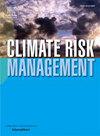Integrating environmental ethics into climate change adaptation policies in Bangladesh: a narrative review
IF 5
2区 环境科学与生态学
Q1 ENVIRONMENTAL SCIENCES
引用次数: 0
Abstract
This article examines how environmental ethics are integrated into Bangladesh’s climate change adaptation policies, with a focus on the National Adaptation Plan (NAP) 2023–2050 and the Bangladesh Delta Plan (BDP) 2100. Using a narrative review methodology grounded in moral philosophy, the study applies key ethical frameworks including distributive, procedural, and intergenerational justice, the precautionary principle, ecological stewardship, and biocentric and ecocentric perspectives drawn from UNESCO and COMEST declarations to assess the ethical orientation of these policies. The analysis reveals that the NAP places stronger emphasis on participatory justice, gender and social inclusion, and ecosystem-based adaptation, indicating a gradual shift toward biocentric and ecocentric approaches. In contrast, the BDP 2100 reflects a predominantly technocratic and anthropocentric framing, privileging infrastructure and economic growth while only conditionally recognizing ecological integrity and intergenerational responsibility. Both documents highlight progress in embedding ethical considerations but show gaps in enforceability, indigenous knowledge integration, and accountability mechanisms. Limitations of this study stem from its reliance on document-based analysis rather than field validation; future research should incorporate stakeholder engagement and ethical audits of policy implementation. Overall, the core finding is that while Bangladesh’s climate policies increasingly acknowledge ethical imperatives, their normative integration remains uneven, underscoring the urgent need for enforceable ethical safeguards to achieve climate governance that is equitable, sustainable, and morally coherent.
将环境伦理融入孟加拉国气候变化适应政策:叙述性回顾
本文探讨了环境伦理如何融入孟加拉国的气候变化适应政策,重点关注2023-2050年国家适应计划(NAP)和2100年孟加拉国三角洲计划(BDP)。本研究采用以道德哲学为基础的叙述性回顾方法,应用了来自联合国教科文组织和COMEST宣言的关键伦理框架,包括分配、程序和代际正义、预防原则、生态管理以及生物中心和生态中心观点,以评估这些政策的伦理取向。分析表明,NAP更加强调参与性正义、性别和社会包容以及基于生态系统的适应,表明其逐渐转向以生物中心和生态中心为中心的方法。相比之下,BDP 2100反映了一个主要的技术官僚和以人类为中心的框架,优先考虑基础设施和经济增长,同时只有条件地承认生态完整性和代际责任。这两份文件都强调了在纳入伦理考虑方面取得的进展,但显示了在可执行性、本土知识整合和问责机制方面的差距。本研究的局限性在于它依赖于基于文献的分析,而不是现场验证;未来的研究应纳入利益相关者的参与和政策实施的道德审计。总体而言,研究的核心发现是,尽管孟加拉国的气候政策越来越承认道德要求,但其规范性整合仍然不平衡,这突显了迫切需要可执行的道德保障措施,以实现公平、可持续和道德一致的气候治理。
本文章由计算机程序翻译,如有差异,请以英文原文为准。
求助全文
约1分钟内获得全文
求助全文
来源期刊

Climate Risk Management
Earth and Planetary Sciences-Atmospheric Science
CiteScore
8.20
自引率
4.50%
发文量
76
审稿时长
30 weeks
期刊介绍:
Climate Risk Management publishes original scientific contributions, state-of-the-art reviews and reports of practical experience on the use of knowledge and information regarding the consequences of climate variability and climate change in decision and policy making on climate change responses from the near- to long-term.
The concept of climate risk management refers to activities and methods that are used by individuals, organizations, and institutions to facilitate climate-resilient decision-making. Its objective is to promote sustainable development by maximizing the beneficial impacts of climate change responses and minimizing negative impacts across the full spectrum of geographies and sectors that are potentially affected by the changing climate.
 求助内容:
求助内容: 应助结果提醒方式:
应助结果提醒方式:


